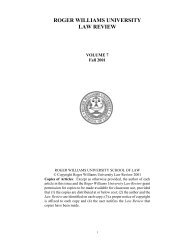Garret Graves - Roger Williams University School of Law
Garret Graves - Roger Williams University School of Law
Garret Graves - Roger Williams University School of Law
Create successful ePaper yourself
Turn your PDF publications into a flip-book with our unique Google optimized e-Paper software.
<strong>Roger</strong> <strong>Williams</strong><strong>University</strong>itDeepwater HorizonApril 13, 2011garret gravesChair, Coastal Protection and Restoration Authoritygarret@LA.gov; 225.342.7669restoring and protecting Louisiana’s coast
TodaySource: Earth Systems Research Laboratory
60 Million Years Ago
55 Million Years Ago
50 Million Years Ago
45 Million Years Ago
40 Million Years Ago
35 Million Years Ago
30 Million Years Ago
25 Million Years Ago
20 Million Years Ago
15 Million Years Ago
10 Million Years Ago
5 Million Years Ago
TodaySource: Earth Systems Research Laboratory
Mississippi River & Tributaries(MRT)
A healthy, accreting coastal system –Before river leveesA system that was building ~ 1 square mile <strong>of</strong> landa year is now collapsing and unsustainable
THEN, THE FLOODSCAME…
The Great Flood <strong>of</strong> 1927• Most destructive ti river flood• 145 levee breaks• 27,000 square miles floodedd• 246 deaths
Mississippi River & Tributaries (MRT)The Flood Control Act <strong>of</strong> 1928 put flood control on par with other majorprojects <strong>of</strong> its time with the largest public works appropriation ever.
Coastal Land LossOver 2300 square miles lost since 1930
Terrebonne Land/Water Change 1988-2005ChauvinDulacPoint AuxCheneCocodrieLandsat TM 1998DeWitt Braud, LSU Coastal Studies Institute
Greatest Ecosystem Loss“Coastal wetland losses inLouisiana account for up to 90percent <strong>of</strong> the total coastalwetlands loss occurring in thelower 48 states today andexpose the state’s coastalareas to the devastating effects<strong>of</strong> hurricane storm surges.”Coastal Wetlands: Lessons Learned From Past Efforts inLouisiana Could Help Guide Future Restoration and ProtectionGAO, December 2007
OIL SPILL
NOTE: smooth coastlineCoastal Mississippi
Coastal LouisianaNOTE: fragmented shoreline and wetlands
Coastal AlabamaNOTE: smooth coastline and contiguous barrier islands
Coastal LouisianaNOTE: oil shoring in coastal Louisiana will be much more difficult to ever clean and willhave longer-term impacts on ecosystem
Coastal Florida
Coastal Louisiana
Coastline/ShorelineNOTE: compare coastline miles to shoreline miles. Louisiana has a disproportionateratio
At Risk• Commercial Fishermen– Hundreds <strong>of</strong> thousands <strong>of</strong> Louisianans– Unique culture– Best food in the nation/restaurants• Most Productive Ecosystem– Oysters– Shrimp– Finfish– Crabs
At RiskTop Recreational Fishing Destination•Bait shops•Marinas•Tackle suppliers•Restaurants•Hotels
At Risk• Reverses recovery from Hurricanes Katrina, Rita,Gustav and Ike– Communities– Coastal systems– Economies• Threatens unique culture, heritage and way <strong>of</strong> life• Fundamentally destroys ecosystems/coastalresources
At Risk• 40% <strong>of</strong> the coastal marshlands in the continentalUnited States• 18% <strong>of</strong> all waterborne commerce in the UnitedStates• USFWS: “fishery supported by this area remainsthe most productive in North America”– 90% <strong>of</strong> species– 98% <strong>of</strong> commercial fish and shellfish
At Risk• Five million waterfowl• 25 million songbirds• America’s largest wintering habitat for migratorywaterfowl and songbirds• 70 rare, threatened, or endangered species• Coastal wetlands serve as a buffer and retentiontiarea for storm surge• Wetlands serve as part <strong>of</strong> the hurricane protection• Wetlands serve as part <strong>of</strong> the hurricane protectionsystem
Oil in Wetlands Almost Impossible to Remove•Burning wetlands•Leaving oil in place•NIC recognizedpreference <strong>of</strong>shoreline impactversus coastalwetland impact
Disproportionate Impacts to Louisiana• In nearly all categories, the impacts to Louisiana’s natural resources have beengreater than all other states combined.• An estimated 92% <strong>of</strong> the currently heavy to moderately oiled shorelines in theGulf are Louisiana shorelines.• Louisiana’s shorelines have consistently represented over 80% <strong>of</strong> heavy tomoderately oiled Gulf shorelines at any given time.• Louisiana’s shorelines have consistently represented over 50% <strong>of</strong> all totalshoreline miles oiled, and over 50% <strong>of</strong> all shoreline miles oiled at any given time.• Approximately 60% <strong>of</strong> all birds and 60% <strong>of</strong> all mammals collected in response tothe spill were collected in Louisiana.• Over 65% <strong>of</strong> all birds found visibly oiled and dead have been found in Louisiana.
Revisiting OPA 90Examples:• “Temper” role <strong>of</strong> the RPs in response and recovery• Lift cap on “per incident” against OSLTF• Improve role <strong>of</strong> state/locals in ICS• Requiring a down payment against NRDA/fines• Pre-positioning response resources• Dedication <strong>of</strong> R&D funding• Streamline technology/dispersant/remediationapprovals• Catastrophic disaster (Price-Anderson)
Future <strong>of</strong> Offshore Energy• Hundreds <strong>of</strong> billions <strong>of</strong> barrels <strong>of</strong> oil produced overseveral decades• Trillions <strong>of</strong> cubic feet <strong>of</strong> natural gas produced• Risk associated with global transport/GhGs• Moratorium: no corresponding reduction in demand• Increasing imports/hundreds d <strong>of</strong> billion$ toVenezuela, Nigeria, Middle East…o American Valueso Environmental stewardship• DWH was an anomaly/gross negligence• Continue to pursue alternative energy sources
Examples <strong>of</strong> Lessons Learned• “No walrus or seals in the Gulf <strong>of</strong> Mexico• Can’t rely upon “those passed on” for help• Oil can transport over 50 miles unimpeded to ourshores”• Federal agencies must conduct more rigid reviews<strong>of</strong> response plans• Oil spill response technologies need innovation• Good contingency plans v. good implementation• Improved integration <strong>of</strong> govt/response entities• RPs SHOULD NOT RUN RESPONSE
Thank You For the Opportunity<strong>Garret</strong> <strong>Graves</strong>garret@LA.gov225.342.7669
Cannot Allow for Wasted Sediment(aka potential land)
Storm Surge Attenuation BenefitsProvided by Coastal WetlandsSurgeSurge
















